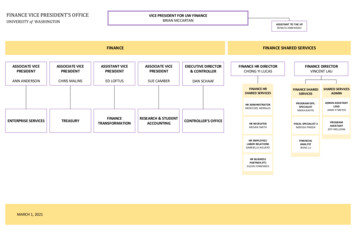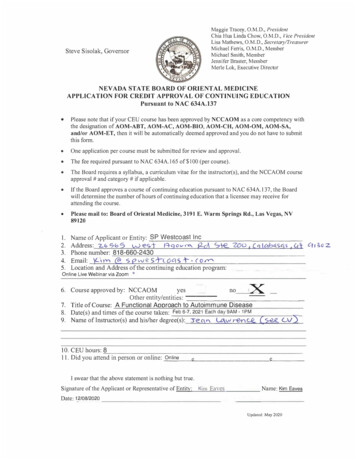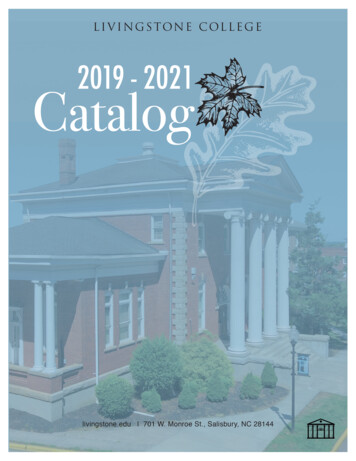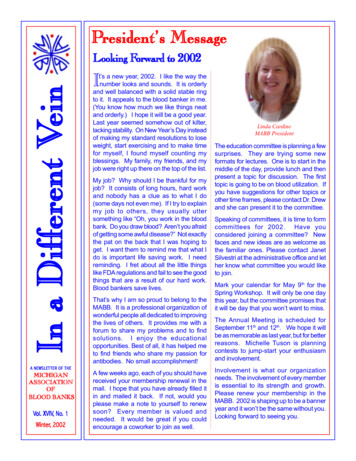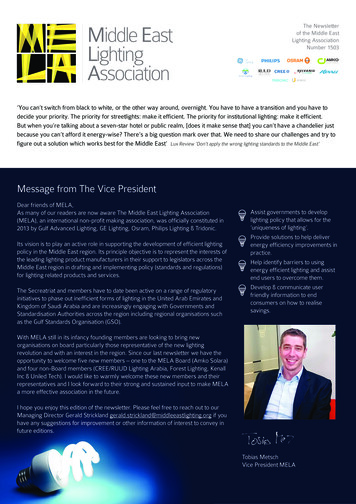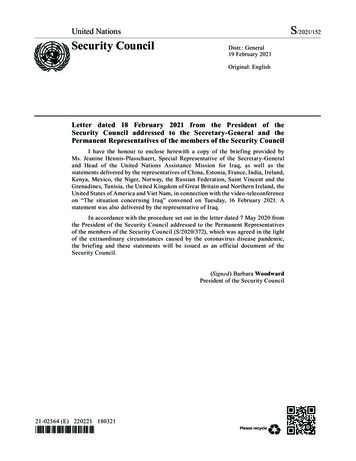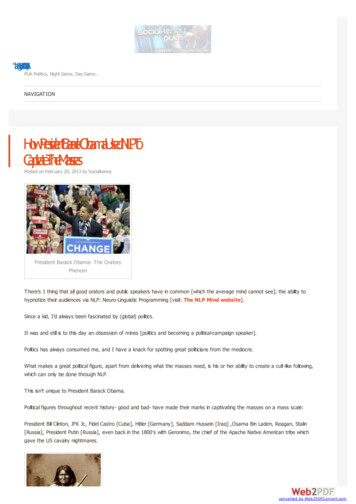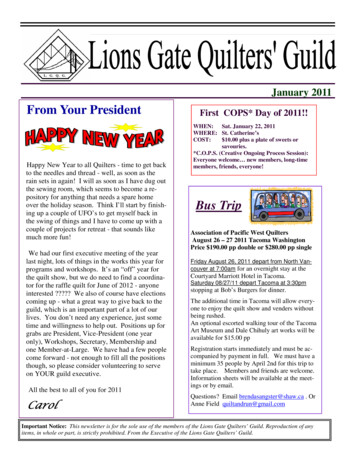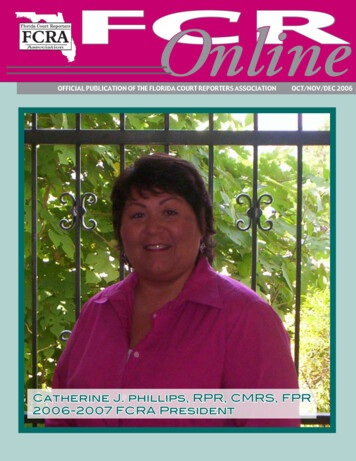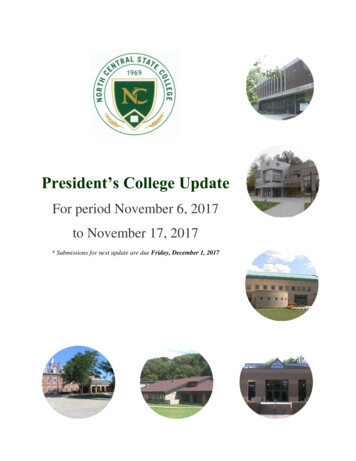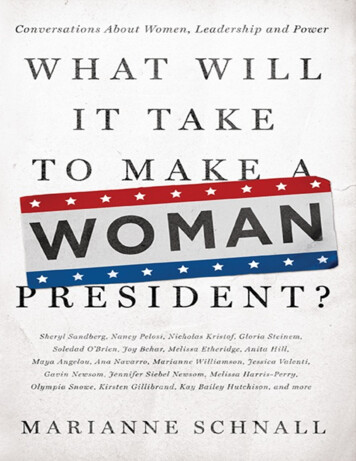
Transcription
WHAT WILLIT TAKETO MAKE AWOMANPRESIDENT?
Conversations About Women, Leadership and PowerMARIANNE SCHNALLSEAL PRESS
What Will It Take to Make a Woman President?Copyright 2013 Marianne SchnallPublished bySeal PressA Member of the Perseus Books Group1700 Fourth StreetBerkeley, Californiawww.sealpress.comAll rights reserved. No part of this book may be reproduced or transmitted in any form without written permission from the publisher, except by reviewers who mayquote brief excerpts in connection with a review.All quotes and material included in this book are from Marianne Schnall’s exclusive interviews, most of which were conducted specifically for this book. Someindividual quotes were excerpted from interviews that originally appeared in publications including CNN.com, Feminist.com, The Huffington Post, Omega Women’sLeadership Center, and Women’s Media Center; some also appeared in Daring to Be Ourselves: Influential Women Share Insights on Courage, Happiness, andFinding Your Own Voice. Portions of the Maya Angelou and Kirsten Gillibrand interviews also appeared at The Huffington Post and Feminist.com. Portions of theMarianne Williamson interview also appeared at The Huffington Post.ISBN: 978-1-58005-497-3Library of Congress Cataloging-in-Publication DataSchnall, Marianne.What will it take to make a woman president? / by Marianne Schnall.p. cm.1. Women—United States—Interviews. 2. Women political activists—United States. 3. Women presidential candidates—United States. 4. Politicians—UnitedStates—Attitudes. 5. Women—United States—Attitudes.I. Title.HQ1161.S378 2013305.4092—dc23[B]2013031218Cover design by Faceout Studio, Kara DavisonInterior design by meganjonesdesign.comDistributed by Publishers Group West
To my incredible daughters, Jazmin and Lotus, and allthe other extraordinary girls and women around the worldMay your sense of self-worth, abilities, dreams,and opportunities be limitless
NOTE TO READERS:More interviews with politicians, public officials, celebrities, journalists, writers, and other thought leaders can be foundonline at womanpresidentbook.com, and in the e-book edition of this book.
CONTENTSINTRODUCTIONMELISSA HARRIS-PERRYJENNIFER SIEBEL NEWSOMPAT MITCHELLDONNA BRAZILEMARY FALLINJOY BEHARANA NAVARROMAYA ANGELOUMICHAEL KIMMELBARBARA LEECLAIRE MCCASKILLOLYMPIA SNOWEGAVIN NEWSOMNANCY PELOSIDON MCPHERSONSOLEDAD O’BRIENSHERYL SANDBERGJESSICA VALENTIMARIANNE WILLIAMSONMELISSA ETHERIDGENICHOLAS KRISTOFGLORIA STEINEMANITA HILLKIRSTEN GILLIBRANDELIZABETH LESSERKATHY NAJIMYELEANOR HOLMES NORTONMARIE WILSONKAY BAILEY HUTCHISONGLORIA FELDTCOURTNEY E. MARTINRACHEL SIMMONS
DIANE VON FURSTENBERGCAROL GILLIGANELEANOR SMEALMARSHA BLACKBURNROBIN MORGANMARY MATALINJODY WILLIAMSCATHY MCMORRIS RODGERSAMY RICHARDSILEANA ROS-LEHTINENSANDRA FLUKECELINDA LAKEJULIE ZEILINGERSTEPHANIE SCHRIOCKCAROL JENKINSCECILE RICHARDSACKNOWLEDGEMENTSABOUT THE AUTHOR
INTRODUCTIONTwith a question. When Barack Obama was first elected, my family and I were talking about howwonderful it was to have our first African American president. My then-eight-year-old daughter, Lotus, looked at methrough starry eyes and deadpanned this seemingly simple, obvious question: “Why haven’t we ever had a womanpresident?” It was a really good question, one that, despite having spent two decades running the women’s nonprofit websiteFeminist.com and writing about women’s issues, I found difficult to answer. But it is these types of questions, often out ofthe mouths of babes, that can wake us up out of a trance. Many inequities have become such a seamless part of our historyand culture that we may subliminally begin to accept them as “just how it is” and not question the “why” or explore thepossibility that circumstances could be different.It does seem a bit crazy when you think of it: When so many other nations have women presidents, why doesn’t theUnited States? Margaret Thatcher was elected prime minister of Great Britain three times. Argentina, Iceland, thePhilippines, Nicaragua, Ecuador, Finland, Ireland, Liberia, Chile, and South Korea have elected female heads of state. Yetthe United States, presumably one of the most progressive countries in the world, lags dismally behind. We have finallyelected an African American president; when will we celebrate that same milestone for women?The closest we have come to having a woman president was Hillary Clinton’s nearly successful primary campaignagainst Barack Obama in 2008. In Obama, she had a formidable opponent, one who also broke through important barriers.Though it was a tight, fascinating, and at times contentious race, Obama prevailed. As Hillary observed in her powerfulconcession speech, “Although we weren’t able to shatter that highest, hardest glass ceiling this time, thanks to you, it’s gotabout eighteen million cracks in it.” She added, speaking to the emotional crowd gathered at Washington’s National BuildingMuseum, “And the light is shining through like never before, filling us all with the hope and the sure knowledge that the pathwill be a little easier next time. That has always been the path of progress in America.”Fast-forward a few years later to the 2011 primary season, when I was talking to an editor at CNN’s In America divisionabout writing a piece for them. I was about to cover the Women’s Media Center awards, where I would be interviewingpeople like Gloria Steinem, Jane Fonda, Sheryl Sandberg, Arianna Huffington, and others, so I asked CNN if there were anyquestions in particular they wanted me to ask. They said they were interested in the attendees’ impressions of why womenhave gained such little momentum in Washington just four years after having a near presidential contender, and what we cando to get more women into the pipeline of political leadership. Taking that one step further, I decided to add a questionrelated to my daughter’s query by asking, “What will it take to make a woman president?” That article wound up on theCNN home page and received hundreds of comments, both positive and negative. The popularity of the article made merealize how important and timely this topic really was, and that it was worth exploring even further.So here it is: my journey to get answers to some of these questions through speaking to some of the most influentialjournalists, activists, politicians, and thought leaders of today. Why haven’t we had a woman president? What will it take?And why is it important? While I use a woman president as a symbol, this book is also about the broader goal of encouragingwomen and girls as leaders and change agents in their lives, their communities, and the larger world. It also explores themany changing paradigms occurring in politics and in our culture, which the recent election seems to confirm. I hope tospotlight these positive shifts, as well as identify where the remaining obstacles and challenges are, in hopes that by lookingat these themes from so many sides and perspectives, we can move closer to meaningful and effective solutions.Certainly, we need to imagine not only a world where a woman can be president, but one in which women are equallyrepresented in Congress and many other positions of leadership and influence in our society. While it was history-making tohave elected twenty women to the Senate in 2012, 20 percent is still far from parity. Women are 50 percent of thepopulation, yet they occupy just a fraction of that in elected office. The United States currently ranks seventy-seventh on aninternational list of women’s participation in national government. And the numbers are not much better in the corporateworld: a meager twenty-one of the Fortune 500 CEOs are women, and women hold about 14 percent of executive-officerpositions and 16 percent of board seats. Women are in only about 5 percent of executive positions in the media. Across theboard, women are rarely adequately represented at the tables where important decisions are being made.Yet everywhere I look today, very promising campaigns and projects are emerging to help women attain positions ofHIS BOOK STARTED
influence and leadership. A few years ago, I wrote an article about then–Secretary of State Hillary Clinton’s Women inPublic Service Project, whose ambitious goal is global, political, and civic leadership of at least 50 percent women by 2050. Ialso interviewed Senator Kirsten Gillibrand about her Off the Sidelines Project, which is “a nationwide call to action to getmore women engaged . . . to enter political life and be heard on political issues.” And Facebook COO Sheryl Sandberg’sbook, Lean In, has certainly helped to spark a nationwide conversation and movement and an important debate over thefactors impacting women’s leadership and advancement in the workplace.When I first set out to create this book, I estimated that I might do twenty interviews. As it turns out, I more than doubledthat number. And since these important topics of women, leadership, and power have come up frequently in so many of mypast interviews with high profile figures, I decided to also include some of their insightful quotes on spreads interspersedthroughout the book. Writing this book has indeed been a fascinating journey and adventure in and of itself, and has almosthad a life of its own. I was so heartened and felt so supported by the many incredible people who not only granted me aninterview for this book but also suggested others I should talk to, often giving me contact information or makingintroductions for me. From this response, I realized that this is a topic that is on everyone’s mind right now, and, as many ofthe people I interviewed—from Donna Brazile to Pat Mitchell—seemed to indicate, “now is the time.”These are issues that I think benefit from a hashing-out of multiple perspectives: men’s, women’s, Republicans’,Democrats’, racial, and generational. I tried as best I could within the limited time, capacity, and access I had to include andreach out for that diversity, but, of course, I do recognize that this is but a small sampling of outlooks. My hope is that thisbook will be enlightening, educational, thought-provoking, and entertaining, as well as a call to action.While it does not necessarily offer any easy, quick, or complete solutions to the complex, multifaceted questions of howwe can help women move into more positions of influence and leadership, my hope is that it will help to identify some of theobstacles so that we can at least be aware of them—and be woken up, as my daughter’s question did for me, to beingproactive, rather than simply accepting the current state of affairs as “just how it is.” It will take long, engaged, thoughtfulconversation and effort, from both men and women, to move our systems and culture along.I thank all of the remarkable people in this book for being a part of this literary roundtable and for the meaningful workthey do on the many prongs of these issues. And, since I would still like to include so many viewpoints and ongoingresources, a portion of the proceeds of this book will go toward continuing the conversation and community around women’sleadership at the eighteen-year-old women’s website and nonprofit I run, Feminist.com. I hope you will join me insupporting this movement, and I hope by the time my daughter has her own children (if that is her choice!), we will live in aworld where having a woman president seems not like an unachievable and daunting milestone, but instead like one that girlseverywhere can aspire to and reach, if that is their destiny and calling.
MELISSA HARRIS-PERRY“I am constantly telling the women in my classes that they should consider running for office, mostly because whatwe know is that when men are talented and when men are smart and when men show some leadership, it’s hard forthem to even get to college without someone, at some point, asking them, ‘Hey, have you ever thought about runningfor office? Man, you would be a great president.’ Even as little tiny boys, right? It turns out that we don’t have thosesame kinds of standard messages for girls. So if a woman is very talented and can remember people’s names and sheshows a lot of interest in politics, we tend to say things like ‘Good job’ or ‘Here’s an A on your paper,’ but we don’ttend to say, ‘Hey, have you ever thought about running for office?”MV. HARRIS-PERRY is host of MSNBC’s Melissa Harris-Perry. She is also professor of political science atTulane University, where she is founding director of the Anna Julia Cooper Project on Gender, Race, and Politics inthe South. She previously served on the faculties of the University of Chicago and Princeton University.Harris-Perry is author of the well received new book, Sister Citizen: Shame, Stereotypes, and Black Women in America,which argues that persistent harmful stereotypes—invisible to many but painfully familiar to black women—profoundlyshape black women’s politics, contribute to policies that treat them unfairly, and make it difficult for black women to asserttheir rights in the political arena. Her first book, Barbershops, Bibles, and BET: Everyday Talk and Black Political Thought,won the 2005 W. E. B. Du Bois Book Award from the National Conference of Black Political Scientists and the 2005 BestBook Award from the Race and Ethnic Politics Section of the American Political Science Association.Harris-Perry is a columnist for The Nation magazine, where she writes a monthly column also titled Sister Citizen. Inaddition to hosting her own show on MSNBC, she provides expert commentary on U.S. elections, racial issues, religiousquestions, and gender concerns for Politics Nation with Reverend Al Sharpton, The Rachel Maddow Show, The Last Wordwith Lawrence O’Donnell, and other MSNBC shows. She is a regular commentator on Keeping it Real Radio with ReverendAl Sharpton and for many print and radio sources in the U.S. and abroad.ELISSAMARIANNE SCHNALL:Why do you think we’ve not yet had a woman presid
soledad o’brien sheryl sandberg jessica valenti marianne williamson melissa etheridge nicholas kristof gloria steinem anita hill kirsten gillibrand elizabeth lesser kathy najimy eleanor holmes norton marie wilson kay bailey hutchison gloria feldt courtney e. martin rachel simmons 8. diane von furstenberg carol gilligan eleanor smeal marsha blackburn robin morgan mary matalin jody williams .
